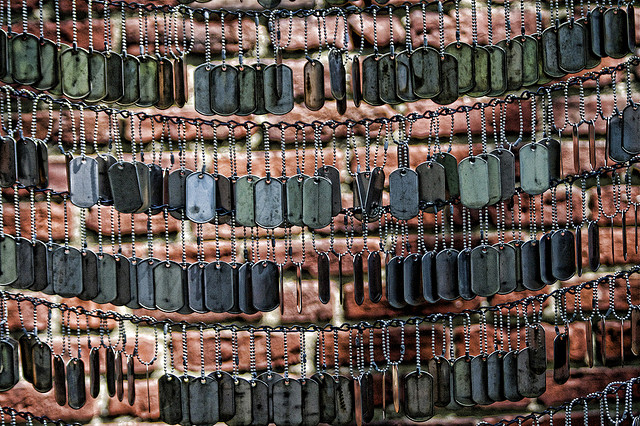
By Samantha Tucker
A few months before his death in Iraq, my brother told our mother this: “If I don’t make it back, you better not be one of those mothers standing and screaming in front of the White House.” Though he had it right—she is that kind of mother—it’s been six years now, and all is quiet. Our mother is in her own suburban white house, finally remodeling the kitchen that needed it long before Ronnie was killed in Baghdad.
A series of endless zeroes greeted my stepdad at the bank the morning after, and he found himself stepping away from the ATM, as though he’d done something wrong.
She paid off the mortgage on that white house with some of the half a million received as a kind of sheepish reparation, some gross financial apology. The money was deposited this way: the first $100,000 appeared in my parent’s account just hours after the men in uniform made the announcement at their door. A series of endless zeroes greeted my stepdad at the bank the morning after, and he found himself stepping away from the ATM, as though he’d done something wrong. They were half-a-million-aires less than a week after the I.E.D. erupted through the truck Ronnie drove across the desert, took him and his captain out too. My parents paid off their student loans and bought a car, or two, gave my sister and me each an amount we’d do anything to give back.
We burned through it, all of us—got rid of the money as fast as we could. The money has been spent for years, is not a part of the funds our mother uses to replace the kitchen flooring, to paint the cabinets a soft, faint yellow, “like a faded banana,” she says.
The process has been arduous. First, she had to sand the surface of the wood, erase the layers of grime and worn splintered façade by hand. Next, she primed it. Then she painted one soft coat, and one more. Now she’ll distress the cabinets by using another layer of paint called “Asphaultum.” I like to imagine her distressing them by standing and screaming at the cabinets: “You are old and you are bad! I wish I could just replace you!” My husband prefers to imagine she is de-stressing them, rubbing their sides and telling them they are good, they are worthy, they are improving. In actuality she and my devoted, exhausted stepfather, have spent a week of renewal only to make the cabinets look old again, or “vintage” or “antique.”
It is 2015. And that list of things that never existed in Iraq is a list I can only make as a person who has lost a brother at war.
It is fashionable for things to repeat themselves. The news this week seems a decade old or more. The headlines say “IRAQ” but maybe they’ve never stopped saying that. I swear it’s 2001 again, and I must be in high school—which means my brother and sister are, too, which means our brother is still alive and there is time to keep him from the desert. There is time to convince America that there is no reason to go there. There are no Iraqi links to 9-11; there are no Weapons of Mass Destruction; it is not our duty, or my brother’s, to plant metaphorical seeds of democracy. But I am wrong. It is 2015. And that list of things that never existed in Iraq is a list I can only make as a person who has lost a brother at war. I’ve just turned thirty but still I have this adolescent urge to erase the past rather than accept it.
Is it that? An adolescent urge? Or is this what growing older really means, wondering each night if I will fall asleep and wake up 16, if the night will trigger some magical reset button—could I wake up tomorrow in a past where the last decade or more never happened?
The “Asphaultum” isn’t working. “Yeah, this is actually the second distressing we’ve tried,” my mother admits into the phone. “The first distress paint we tried was a reddish color,” she sighs, “and it just looked like a hand print, like someone swiped across the cabinet.” The third they will try is a quaintly named brown, something like “Homestead Honey” or “Sepia’d,” because Asphaultum “is just making everything look dirty,” my stepdad chimes in. They are running out of warm, sunny days—the kitchen remodel is a warm and sunny kind of project, hopeful and promising. Until they finish, the fridge is plugged in but hanging out in the living room. The white house is littered with takeout boxes and take-out-dirtied dishes, the clutter whispering behind my mother’s back. The kitchen floor hasn’t even been started, and the wood planks my parents will install themselves wait in the garage because the fool who owned the house before us put carpet in the kitchen. He didn’t realize a carpeted kitchen is not logical or stylish, but disgusting—the carpet hoards every last crumb, acts as an In Memoriam for anything the kitchen once held, no matter the unending times my mother vacuumed, got down on her hands and knees and scrubbed.

